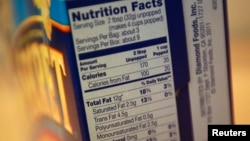The U.S. government announced it will phase trans fats out of all foods over the next three years. Trans fats are a food additive that contributes to coronary artery disease and fatal heart attacks. At least one expert thinks the food industry will continue to actively market food with trans fats in developing countries.
Many developed countries, including Australia and those in the European Union, have eliminated trans fats from processed and fast foods. Trans fats raise the level of so-called bad cholesterol and lower good cholesterol, and their use has been on the decline in the U.S. for more than ten years.
Now, the United States — a huge market for processed foods — is ordering manufacturers and restaurants to completely phase out trans fats over a three-year period.
Two years ago, the U.S. Food and Drug Administration declared that trans fats, which are added to food to improve taste and shelf life, are no longer recognized as safe.
But Lawrence Gostin, a legal expert on national and global health law at Georgetown University in Washington D.C., thinks none of these moves will stop the worldwide sale of foods made with trans fats.
“I could see them continuing to market these harmful products in India, Brazil and other middle income countries, and then in low income countries in Africa and the Middle East and elsewhere,” he said.
That’s because foods containing trans fats taste good. The harmful food additive is in refrigerated piecrust and dinner rolls, liquid coffee creamer and microwaveable popcorn. Trans fats are also added to oils to turn them into solid cooking fat and margarine.
Gostin thinks the food industry might now step up sales of these products in developing countries.
“The question is — is whether they then dump their unhealthy, trans fatty acid products on to poorer countries around the world with less robust regulatory systems," he said. "And I just think that’s unethical but expected.”
Gostin calls the presence of trans fats in foods a global health emergency, and he hopes countries with no regulatory restraints against the food additive will follow the lead of the U.S. and other countries
“We can’t just sit back," he said. "This is a silent epidemic. It’s no less an epidemic than AIDS, tuberculosis, malaria or any of these major outbreaks.
Gostin said an international revolution is needed to get the food industry to make the food supply safer and healthier.




